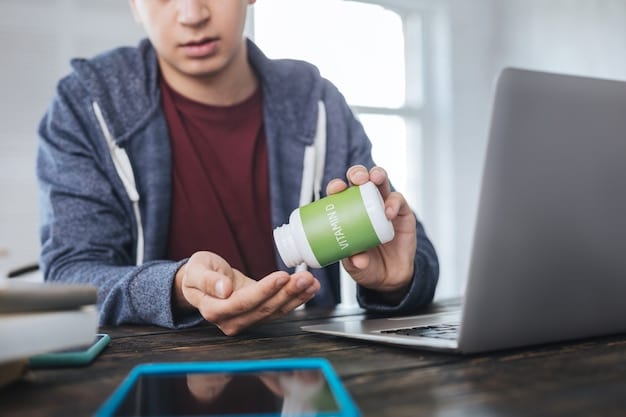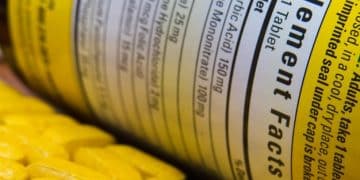Spotting Fake Anti-Aging Supplements Online 2025: US Guide

Navigating the digital marketplace for anti-aging supplements requires vigilance to avoid fraudulent products, understanding that deceptive claims, lack of scientific backing, and unusual pricing are key indicators of fake supplements consumers in the US must identify.
In the vast and often confusing landscape of online health products, distinguishing genuine anti-aging supplements from fraudulent ones has never been more critical. This guide provides US consumers with essential tools and knowledge to identify and avoid fake anti-aging supplements in 2025, safeguarding both your health and your wallet.
Understanding the Anti-Aging Market Landscape in 2025
The anti-aging supplement market is booming, projected to reach unprecedented valuations in 2025. This growth is fueled by an aging population seeking ways to maintain vitality and a youthful appearance, alongside continuous advancements in nutritional science. However, with opportunity comes exploitation, as unscrupulous vendors flood online platforms with products making extravagant claims, often lacking any scientific merit or regulatory oversight.
Consumers are increasingly turning to online retailers for convenience and a wider selection, but this digital storefront also presents unique challenges. The anonymity of the internet allows deceptive practices to flourish, making it difficult to discern between legitimate companies and those preying on consumer hopes. Scams can range from ineffective placebos to products containing harmful, undisclosed ingredients.
The Allure of Quick Fixes and Exaggerated Claims
The marketing of fake anti-aging supplements often preys on deep-seated desires for quick, effortless solutions to complex biological processes. Promises of instant wrinkle vanishing, reversal of cellular aging, or dramatically extended lifespans should immediately raise red flags. Legitimate anti-aging research and products typically present more nuanced, realistic benefits achieved through consistent use and a holistic approach to health.
It’s crucial for consumers to develop a critical eye when encountering language that sounds too good to be true. Terms like “miracle cure,” “secret formula,” or “revolutionary breakthrough” without accompanying credible scientific data are hallmarks of deceptive advertising. Understanding the real science behind aging and supplementation can empower you to differentiate hype from genuine innovation.
Regulatory Gaps and Consumer Vulnerability
In the US, the Food and Drug Administration (FDA) regulates dietary supplements differently from prescription drugs. Supplements do not require FDA approval before being marketed, meaning manufacturers are responsible for ensuring their products are safe and effective before they hit the shelves. This regulatory framework, while intended to foster innovation, can leave gaps that fraudulent companies exploit.
Consumers, therefore, bear a significant responsibility in scrutinizing products. The burden of proof often lies with the buyer to verify claims and assess risks. This guide aims to equip you with the knowledge to navigate these regulatory complexities and protect yourself against misleading information and potentially dangerous products.
Key Indicators of Fraudulent Anti-Aging Supplements Online
Identifying fake anti-aging supplements online requires a keen eye for detail and a healthy dose of skepticism. Several consistent red flags can help consumers distinguish between legitimate products and outright scams. These indicators often appear in combination, strengthening the case for a product’s dubious nature.
First and foremost, extreme or unsubstantiated claims are almost always a tell-tale sign. If a supplement promises to “reverse aging by 20 years in a week” or offers “guaranteed eternal youth,” it’s highly improbable to be true. Real scientific advancements in anti-aging are incremental and supported by extensive, peer-reviewed research, not sensational marketing.
Scrutinizing Scientific Evidence and Research
- Lack of Peer-Reviewed Studies: Genuine anti-aging ingredients often have a body of scientific literature supporting their efficacy. Scammers rarely provide links to reputable, peer-reviewed studies.
- Vague or Anecdotal Evidence: Be wary of testimonials presented as scientific proof, or claims that cite “secret research” or “studies underway” without concrete details.
- Misinterpretation of Research: Some fraudulent companies might selectively quote or misrepresent legitimate research, twisting findings to support their product’s claims.
Questionable Ingredients and Proprietary Blends
The ingredient list is another critical area for examination. Fake supplements often feature vague “proprietary blends” without disclosing the specific amounts of each ingredient. This opacity prevents consumers from verifying if effective dosages are present or if safe levels are maintained. Moreover, look for ingredients with no recognized benefit for anti-aging or those that are known to be unsafe.
Legitimate manufacturers are transparent about their ingredients, their sources, and the scientific rationale behind their inclusion. They understand that informed consumers want to know exactly what they are putting into their bodies.
Unrealistic Pricing and Discount Schemes
- Extremely Low Prices: Manufacturing quality supplements with potent, scientifically-backed ingredients is expensive. Unusually low prices can suggest cheap, ineffective fillers or even harmful substances.
- Exorbitantly High Prices: Conversely, some scammers price their products exceptionally high to create an illusion of exclusivity or premium quality, when the product itself is worthless.
- Pressure Sales Tactics: Beware of “limited-time offers,” “only X left in stock,” or other high-pressure sales tactics designed to rush your purchase before you can properly research the product.
By staying alert to these key indicators, consumers can significantly reduce their risk of falling victim to anti-aging supplement scams. Always prioritize transparency, verifiable science, and common sense over marketing hype a good understanding of How to Spot Fake Anti-Aging Supplements Online: A 2025 US Consumer Guide is vital.
The Red Flags of Online Retailers and Websites
Beyond the product itself, the platform and seller are crucial indicators of legitimacy. The online environment, while convenient, also provides a fertile ground for scams. Knowing what to look for on retail websites can prevent costly mistakes and health risks when seeking anti-aging solutions.
The first point of inspection should be the website’s professional appearance. While a sleek website doesn’t guarantee legitimacy, poor design, grammatical errors, and broken links are frequently found on scam sites. These details suggest a lack of professionalism and a fleeting presence, characteristic of operations that aim to disappear quickly.

Website Credibility and Security Features
Always check for basic security features on e-commerce sites. A secure website address begins with “https://” and displays a padlock icon in your browser’s address bar. This indicates that your personal and payment information is encrypted. Absence of these features is a major red flag.
Furthermore, look for clear and accessible contact information. Legitimate companies will provide a physical address, phone number, and email address. Scam sites often hide this information or provide only generic contact forms that never receive a response. The ease of contact shows a company’s commitment to customer service and accountability.
Reviews and Testimonials: A Double-Edged Sword
- Overly Positive or Identical Reviews: While positive reviews are good, an abundance of generic, overly positive, or strikingly similar reviews can indicate they are fake or paid for.
- Lack of Critical Reviews: No product is universally loved. The complete absence of any mixed or critical reviews is suspicious.
- Unverified Testimonials: Be wary of testimonials with only first names or stock photos. Legitimate reviews often come from verifiable buyers, sometimes with more detailed accounts of their experience.
It’s also beneficial to search for reviews on independent third-party sites rather than relying solely on those posted on the seller’s own website. Consumer review platforms, forums, and social media can offer unbiased insights into a product’s efficacy and a company’s reputation.
Privacy Policies and Terms of Service
Reputable online retailers will have clear, well-written privacy policies and terms of service. These documents should outline how your data is handled, return policies, and dispute resolution processes. The absence of these documents, or their presentation in vague, legally ambiguous language, is a sign of a potentially untrustworthy operation.
A legitimate company stands behind its products and provides clear avenues for returns or complaints. Scammers, on the other hand, often make it difficult to get a refund or resolve issues, disappearing once a sale is made. Due diligence in checking these website elements is a core part of How to Spot Fake Anti-Aging Supplements Online: A 2025 US Consumer Guide principles.
Regulatory Bodies and Consumer Protection in the US
Navigating the complex world of anti-aging supplements requires an understanding of the regulatory landscape designed to protect consumers in the United States. While the FDA plays a crucial role, other government and non-governmental organizations also contribute to ensuring product safety and preventing fraud. Familiarizing yourself with these entities can empower you to make more informed decisions.
The FDA is the primary federal agency responsible for protecting public health by ensuring the safety, efficacy, and security of human and veterinary drugs, biological products, medical devices, our nation’s food supply, cosmetics, and products that emit radiation. For dietary supplements, the FDA monitors product safety after they are on the market. They act when a supplement is found to be unsafe, mislabeled, or making unsubstantiated claims.
The Role of the Federal Trade Commission (FTC)
Beyond the FDA, the Federal Trade Commission (FTC) is a key player in consumer protection. The FTC is responsible for preventing business practices that are anticompetitive or deceptive or unfair to consumers. This includes prosecuting companies that make false advertising claims about their supplements, including those related to anti-aging properties. Reporting suspicious products or companies to the FTC can trigger investigations and help protect other consumers.
Understanding the division of labor between these two agencies is essential. While the FDA focuses on product safety and labeling, the FTC targets deceptive marketing and advertising. Both are vital resources for consumers encountering potentially fraudulent anti-aging supplements.
Third-Party Certifications and Independent Testing
- USP Verification: The US Pharmacopeial Convention (USP) is a non-profit organization that sets standards for drug and supplement quality, purity, and potency. Products bearing the USP Verified mark meet these strict standards.
- NSF International: NSF International is another independent organization that tests and certifies products to ensure they meet public health and safety standards. Their certification indicates meticulous product testing and ingredient verification.
- ConsumerLab.com and LabDoor: These independent organizations conduct their own tests on supplements, providing unbiased reviews and revealing whether products contain what their labels claim, and if they are free from contaminants.
These third-party certifications act as an additional layer of assurance, offering a level of scrutiny that consumers cannot easily perform themselves. While not all legitimate supplements carry these seals, their presence significantly boosts confidence in a product’s quality and contents, making them a crucial aspect to consider when learning How to Spot Fake Anti-Aging Supplements Online: A 2025 US Consumer Guide.
Best Practices for Safe Online Supplement Shopping
Purchasing anti-aging supplements online offers convenience, but it also demands a proactive approach to safety. Adopting a few best practices can significantly reduce your risk of encountering fake products and ensure you invest in supplements that genuinely support your health goals.
One of the most fundamental practices is to always purchase from reputable and well-known retailers. These could be established online pharmacies, large e-commerce health sections, or the official websites of well-known supplement brands. Such retailers have a vested interest in maintaining their reputation and typically implement stricter quality control measures.
Conduct Thorough Research Before Buying
Never make an impulse purchase, especially when it comes to health products. Take the time to research both the supplement and the company selling it. Look for information on the ingredients, their purported benefits, and any potential side effects. Cross-reference claims with scientific sources or expert opinions.
Furthermore, investigate the company’s background. How long have they been in business? Do they have a clear mission and philosophy? A history of transparency and positive customer interactions builds trust, which is invaluable in the online supplement market. This thorough research makes you proficient in How to Spot Fake Anti-Aging Supplements Online: A 2025 US Consumer Guide.
Consult Healthcare Professionals
- Personalized Advice: Before starting any new supplement regimen, especially anti-aging ones, consult with your doctor or a registered dietitian. They can provide personalized advice based on your health status, existing conditions, and current medications.
- Ingredient Safety: A professional can help you understand whether certain ingredients are safe for you and if they might interact adversely with other supplements or medications you are taking.
- realistic Expectations: Healthcare providers can also help set realistic expectations for what particular anti-aging supplements can achieve, steering you away from products making exaggerated or impossible claims.
Read Labels Carefully and Understand Ingredients
Once you acquire a product, carefully read its label. Pay close attention to the dosage instructions, expiration date, and a complete list of ingredients. If anything on the label seems unclear, incomplete, or conflicts with the product’s online description, exercise caution. Look for active ingredients and their concentrations.
Understanding common anti-aging ingredients, such as collagen, hyaluronic acid, resveratrol, and various vitamins, can help you discern whether a product’s formulation is scientifically plausible. Be wary of proprietary blends where individual ingredient amounts are not disclosed, as this prevents you from knowing if effective doses are present.
Emerging Threats and Future Trends in Supplement Fraud (2025)
The landscape of online fraud is constantly evolving, and the anti-aging supplement market is no exception. As technology advances and consumer behaviors shift, so do the tactics of unscrupulous vendors. Staying informed about emerging threats and future trends is an essential component of protecting yourself in 2025 and beyond.
One significant trend is the increasing sophistication of fake online reviews and testimonials. AI-generated text and images can create highly convincing, yet entirely fabricated, endorsements that are difficult for the average consumer to detect. These sophisticated scams make it even more critical to seek out third-party verification and reputable sources.

Deepfakes and AI-Generated Marketing
The rise of deepfake technology poses a new, insidious threat. Fraudsters may use AI to create realistic videos of fake doctors or celebrities endorsing their anti-aging products, making it incredibly challenging for consumers to differentiate between genuine and fabricated endorsements. Education on how to spot these digital manipulations will become increasingly vital.
Furthermore, AI can be used to generate hyper-personalized marketing campaigns, targeting individuals based on their online behavior and health concerns. This tailored approach can make fraudulent products appear more credible and relevant to a user’s specific needs, increasing their susceptibility.
New Ingredients and Unregulated Compounds
- Exotic or “Breakthrough” Ingredients: As scientific research uncovers new compounds, scammers are quick to capitalize on the hype, often selling unregulated or untested versions that may be ineffective or harmful.
- Gray Market Pharmaceuticals: Some fake anti-aging supplements might contain pharmaceutical-grade ingredients or even illegal drugs, posing significant health risks due to unknown dosages and potential interactions.
- Cross-Border Sales: The global nature of online commerce sometimes allows fraudulent products from countries with lax regulations to enter the US market, bypassing standard safety checks.
Consumers need to be particularly wary of “next big thing” products that emerge without a substantial body of evidence or regulatory oversight. While innovation is welcome, hasty adoption of unproven compounds carries inherent risks. This is especially true for ingredients that claim radical or unprecedented anti-aging effects, without thorough scientific backing, something crucial to grasp when understanding How to Spot Fake Anti-Aging Supplements Online: A 2025 US Consumer Guide.
Reporting Suspected Fake Supplements and Seeking Recourse
Even with the most careful vigilance, consumers might occasionally encounter or even purchase a suspected fake anti-aging supplement. Knowing how to report these products and seek recourse is crucial, not only for your own protection but also to prevent others from falling victim to similar scams. Your actions can contribute to a safer online marketplace for everyone.
If you suspect a supplement is fake, or if you experience adverse effects after taking a product, your first step should be to stop using it immediately and consult with a healthcare professional. They can assess any health implications and advise on necessary medical actions.
How to Report to the FDA and FTC
The FDA has a system for reporting adverse events and product quality problems associated with dietary supplements. You can submit a report through their MedWatch program. This information helps the FDA identify problematic products and take appropriate action, such as issuing warnings or initiating recalls.
For issues related to deceptive advertising or fraudulent claims, the Federal Trade Commission (FTC) is the appropriate agency. You can file a complaint with the FTC through their website. Provide as much detail as possible, including product names, company information, website URLs, and specific examples of false claims. These reports are vital for the FTC to investigate and prosecute fraudulent companies.
Contacting the Better Business Bureau (BBB) and State Agencies
- Better Business Bureau (BBB): The BBB allows consumers to file complaints against businesses. While not a regulatory agency, a complaint filed with the BBB can put pressure on a company to resolve an issue and can serve as a warning to other consumers.
- State Attorney General’s Office: Your state’s Attorney General’s office is another resource for consumer protection. They can investigate businesses operating within their state that engage in deceptive practices.
- Credit Card Company/Bank: If you paid for a fraudulent product with a credit card or through a bank, contact your financial institution to dispute the charge. Many offer fraud protection that can help you recover your money.
Document everything: keep records of your purchase, communication with the seller, product labels, and any other relevant evidence. This documentation will strengthen your case whether you are reporting to a government agency or seeking a refund. Being proactive in reporting is an important part of How to Spot Fake Anti-Aging Supplements Online: A 2025 US Consumer Guide and helps to curb the spread of misinformation and harmful products.
The Importance of Personal Health Advocacy
Ultimately, your defense against fake anti-aging supplements online boils down to becoming your own best health advocate. In an era where misinformation can spread rapidly, taking an active and informed role in your healthcare decisions is more critical than ever. This involves a continuous process of learning, questioning, and prioritizing credible sources over marketing hype.
Personal health advocacy means not just reacting to information, but actively seeking it out from reliable sources. It’s about building a strong relationship with your healthcare providers, asking tough questions, and understanding that your health journey is unique. No single supplement can replace a healthy lifestyle, and claims that suggest otherwise should be met with extreme caution.
Cultivating Critical Thinking Skills
Develop a robust set of critical thinking skills when evaluating health information online. Ask yourself:
- Who is making this claim, and what is their agenda?
- Is the evidence presented strong and from reputable sources?
- Are the claims too good to be true?
- Is there a balanced perspective, including potential risks or side effects?
By constantly questioning and evaluating, you empower yourself to navigate the vast sea of information, distinguishing between genuine health advice and deceptive marketing. This mental framework is perhaps the most enduring tool in your arsenal against fraudulent anti-aging products.
Long-Term Health and Lifestyle Choices
Remember that genuine anti-aging is a holistic endeavor. While certain supplements may play a supportive role, they are not standalone solutions. A balanced diet, regular exercise, adequate sleep, stress management, and avoiding harmful habits (like smoking and excessive sun exposure) are the cornerstones of healthy aging.
Focusing on these foundational elements often yields greater and more sustainable anti-aging benefits than relying on unproven supplements. View supplements as potential adjuncts to a healthy lifestyle, not as substitutes for it. This perspective helps in understanding How to Spot Fake Anti-Aging Supplements Online: A 2025 US Consumer Guide principles and ensures you approach your well-being comprehensively.
Your commitment to understanding How to Spot Fake Anti-Aging Supplements Online: A 2025 US Consumer Guide, combined with a dedication to overall wellness, forms the most resilient defense against the promises of snake oil salesmen. Stay curious, stay informed, and always put your health first.
| Key Point | Brief Description |
|---|---|
| 🔍 Suspect Claims | Beware of promises that sound too good to be true, like instant wrinkle reversal or rapid aging reversal, as they lack scientific backing. |
| 🧪 Lack of Evidence | Genuine supplements are supported by peer-reviewed studies. Fraudulent ones often rely on vague testimonials or “secret formulas.” |
| 🛡️ Unreliable Websites | Check for secure connections (HTTPS), clear contact info, and verifiable third-party reviews, avoiding sites with errors or missing policies. |
| 🧑⚕️ Consult Experts | Always consult with a healthcare professional before starting any new supplement to ensure safety and appropriateness for your individual health needs. |
Frequently Asked Questions About Spotting Fake Anti-Aging Supplements
The most common signs include exaggerated promises like “cure-all” or “instant reversal,” a lack of scientific evidence (no links to credible studies), vague “proprietary blends” without ingredient transparency, and extremely low or high prices combined with aggressive sales tactics. Poor website design and generic contact information are also common indicators of fraudulent products.
To verify scientific claims, look for direct references to peer-reviewed studies on reputable scientific databases like PubMed. Be skeptical of claims citing “unpublished research” or relying solely on anecdotal testimonials. Consult independent third-party testing organizations like ConsumerLab.com or NSF International, which provide unbiased evaluations of supplement ingredients and efficacy.
The FDA monitors the safety of dietary supplements after they are on the market, taking action against unsafe products or those making unsubstantiated health claims. The FTC focuses on preventing deceptive advertising and marketing practices. Both agencies rely on consumer reports to identify and address fraudulent products in the market, working to protect public health and consumer trust.
Yes, look for certifications from independent organizations such as USP Verified or NSF International. These seals indicate that the product has been tested for purity, potency, and quality, and that it contains the ingredients listed on the label in the amounts specified. While not all legitimate supplements have these, their presence adds a significant layer of credibility and assurance.
Immediately stop using the product and consult your doctor, especially if you experience any adverse effects. Document everything related to your purchase and the product itself. Report the product to the FDA via their MedWatch program for safety concerns, and to the FTC for deceptive marketing. You can also file a complaint with the Better Business Bureau and dispute the charge with your financial institution.
Conclusion
Navigating the complex world of online anti-aging supplements demands a high degree of skepticism and informed decision-making. By understanding the common tactics of fraudulent vendors, scrutinizing product claims and scientific evidence, evaluating the credibility of online retailers, and leveraging available consumer protections, US consumers can significantly reduce their risk. Prioritizing transparency, third-party verification, and professional medical advice will empower you to make safer choices, ensuring that your pursuit of healthy aging is both effective and secure. Remember, genuine well-being comes from a holistic approach, where supplements play a supportive role, not a miraculous one.





